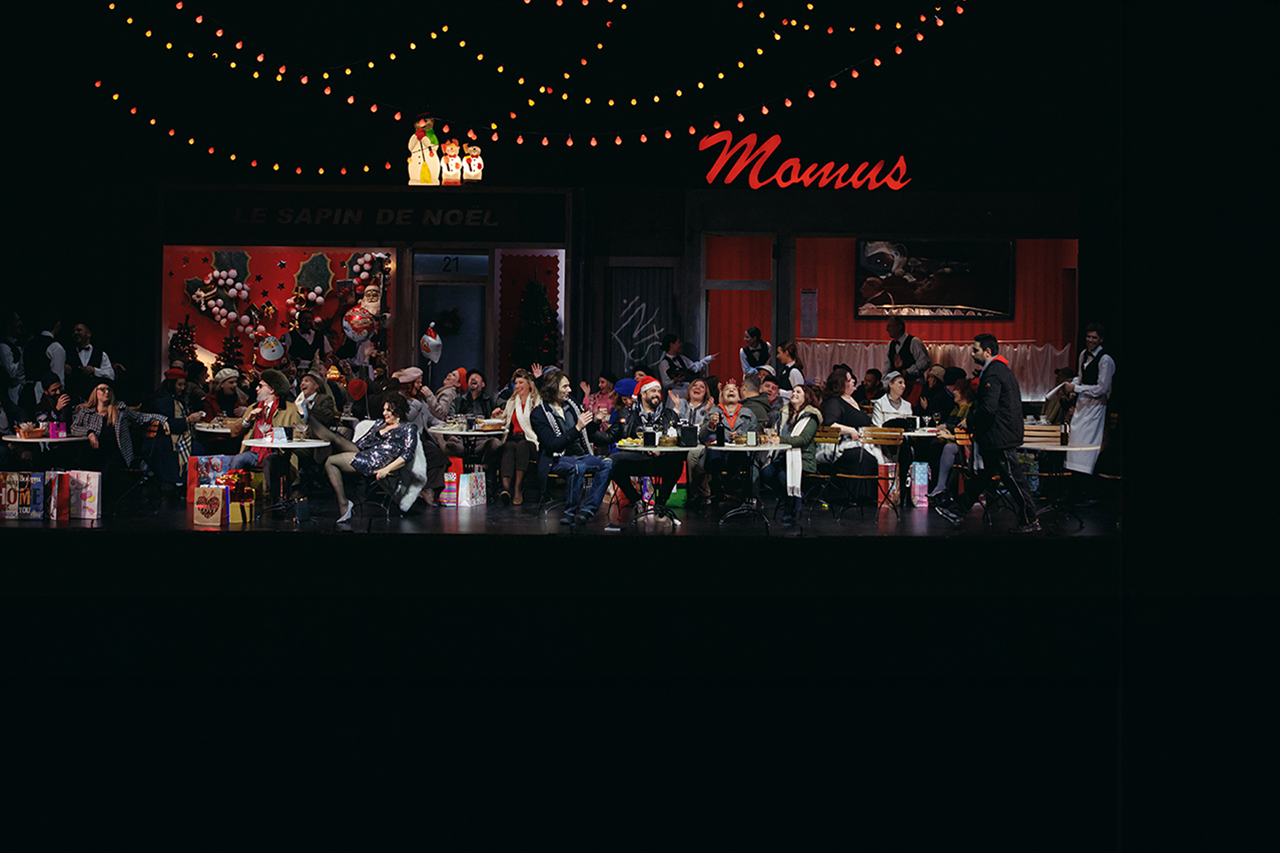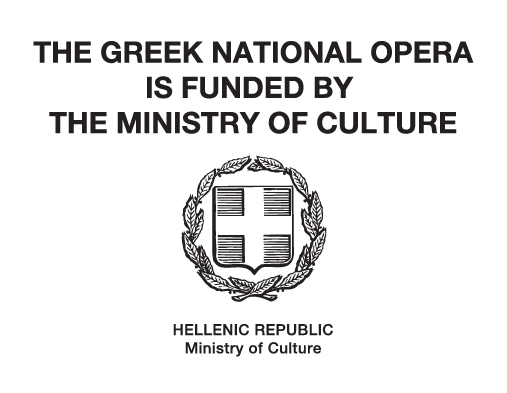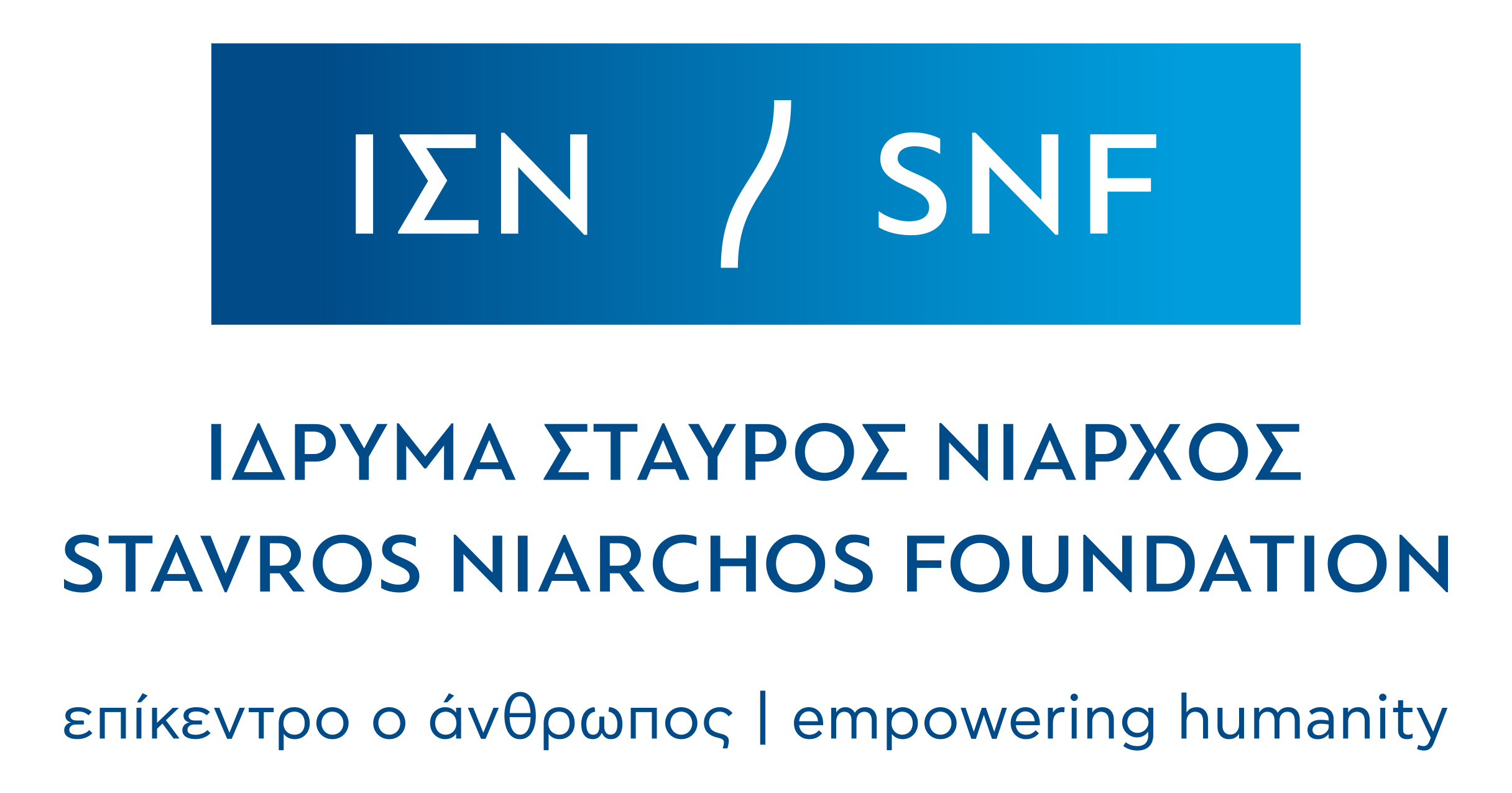Contact
ADDRESS
STAVROS NIARCHOS FOUNDATION
CULTURAL CENTER
364 Syggrou Avenue, Kallithea
TEL.
Box Office:
+30 213 0885700
Box Office email:
boxoffice@nationalopera.gr
Daily 09.00-21.00
info@nationalopera.gr
Register to our Newsletter


Conductor: Ondrej Olos, Philippe Auguin (09/01/2024)
Director: Graham Vick
Revival director: Katerina Petsatodi
Sets, costumes: Richard Hudson
Μovement: Ron Howell
Lighting: Giuseppe di Iorio
Chorus master: Agathangelos Georgakatos
Children’s chorus mistress: Konstantina Pitsiakou
Rodolfo
Yannis Christopoulos, Francesco Demuro (02, 07/01/2024)
Schaunard
Nikos Kotenidis
Benoît
Vangelis Maniatis
Mimì
Vassiliki Karayanni
Marcello
Dionysios Sourbis
Colline
Tassos Apostolou, Petros Magoulas (07, 09/01/2024)
Alcindoro
Kostis Rasidakis, Yannis Yannisis (07, 09/01/2024)
Musetta
Cellia Costea
Parpignol
Thanassis Evangelou
Customs sergeant
Ioannis Kontellis
Customs official
Nikos Syropoulos
With the Orchestra, the Chorus and the Children Chorus of the Greek National Opera (as part of its educational mission)
Ticket prices: €15, €20, €30, €35, €42, €50, €55, €70
Students, children: €12
Limited visibility seats: €10
Opera • Revival
Stavros Niarchos Hall of the Greek National Opera – SNFCC
Starts at: 19.30 (Sunday at: 18.30)| 

GNO lead donor

Production sponsor: PPC (Public Power Company)
The heart-breaking La bohème –Giacomo Puccini’s timeless masterpiece– is making its return seven years after it was last presented at the Greek National Opera, in an iconic production directed by Graham Vick – a true bohemian of the opera world who recently passed away. The production’s nine performances are to be given on 9, 12, 17, 27, 29, 31 December 2023 and 2, 7, 9 January 2024 inside the Stavros Niarchos Hall of the Greek National Opera at the Stavros Niarchos Foundation Cultural Center. Sponsored by the PPC (Public Power Corporation). This production is made possible by a grant from the Stavros Niarchos Foundation (SNF) to enhance the GNO’s artistic outreach.
La bohème is based on the novella Scènes de la vie de bohème (“Scenes of Bohemian Life”) by Henry Murger, and was first presented in 1896 at the Teatro Regio in Turin, conducted by Arturo Toscanini. Set against the backdrop of an icy Paris at Christmastime, the plot of this opera tells of the love between the poet Rodolfo and the seamstress Mimì, from the moment they meet to the moment of her death from consumption. With his powerfully evocative music, Puccini makes audiences run the gamut of emotions in ways sublime: joy and abandon, great love and despair.
Back in 2007, the then Artistic Director of the GNO, Stefanos Lazaridis, commissioned the renowned British director Graham Vick to stage a new production of La bohème at the Greek National Opera. This proved to be the perfect choice, since Vick was a director who knew how to be bold – how to experiment with and creatively confound the conventions and clichés traditionally associated with the opera arts. “We attempted to reveal the essence of the work so as to have something that was as universal to Athens 2007 as to any other time. Not so much as timelessness as the fact that humanity never changes; death is death, poverty is poverty, students are students,” explains Vick in his director’s note, written for the production’s premiere during the 2007/08 season.
With this year’s revival of La bohème, the Greek National Opera is paying tribute to Graham Vick –“the man saving opera in Britain,” as The Telegraph once wrote– who passed away in 2021. His highly successful take on La bohème, the action of which he chose to pluck from 19th-century Paris and place in 21st-century Athens, proved a landmark production for the Greek opera scene. Beyond this production of La bohème, Graham Vick also partnered with the GNO to stage Tannhäuser (2009) and the Cavalleria rusticana – Pagliacci double bill (2011), while his programmed 2019 staging of Don Carlo was never realised due to the health problems he faced.
Sets and costumes are by Richard Hudson, lighting by Giuseppe di Iorio, and movement by Ron Howell. Katerina Petsatodi serves as revival director.
This production is conducted by the internationally acclaimed maestro Ondrej Olos, known to Greek audiences from his previous collaborations with the GNO on the Janáček operas The Cunning Little Vixen and The Makropulos Affair, and on Mozart’s Don Giovanni. The additional performance will be conducted by the internationally acclaimed French maestro Philippe Auguin. Agathangelos Georgakatos serves as chorus master, and Konstantina Pitsiakou as children’s chorus mistress.
The cast features a stellar Greek array of outstanding GNO soloists. In the role of Rodolfo is the acclaimed GNO tenor Yannis Christopoulos, while Mimì is to be played by the leading soprano Vassiliki Karayanni. The role of Musetta is to be performed by the great GNO soprano Cellia Costea, with the acclaimed baritone Dionysios Sourbis taking on the role of Marcello, and the internationally renowned GNO bass Tassos Apostolou that of Colline. Appearing with them on stage are Nikos Kotenidis, Vangelis Maniatis, Kostis Rasidakis, Thanassis Evangelou, Ioannis Kontellis, and Nikos Syropoulos.
With the GNO Orchestra, Chorus, and Children’s Chorus (as part of its educational mission).
La bohème at a glance
The composer / Giacomo Puccini was born in Lucca, Tuscany, on 22 December 1858. Not only was he the fifth of seven children, he was also a fifth-generation musician to spring from a dynasty of local cathedral organists, conductors, and composers (in the main of church music). Puccini remains, to this day, one of the most successful Italian opera composers, since the majority of his works are still performed in repertory at opera houses across the globe. His signature sound had been recognisably forged by just his third opera, Manon Lescaut (1893), while his next three works –La bohème (1896), Tosca (1900), and Madama Butterfly (1904)– saw him celebrated as the most important successor to Giuseppe Verdi. The strikingly melodic music and intense theatricality of his operas gave brilliant answer to the demands of his times. Puccini died in 1924, leaving his final opera –Turandot (1926)– unfinished.
The work / La bohème, “lyrical scenes” in four acts, is based on the novella Scènes de la vie de bohème (“Scenes of Bohemian Life” – 1845/48, 1851) by Henry Murger and on the Théodore Barrière stage play La Vie de bohème (“The Bohemian Life” – 1849), which was inspired by the same source novella. The libretto is by Giuseppe Giacosa and Luigi Illica. The plot tells of the love between the poet Rodolfo and the seamstress Mimì, from the moment they meet to the moment of her ill-fated death from consumption.
Premieres / La bohème was first presented before Italian audiences on 1 February 1896 at the Teatro Regio in Turin, conducted by Arturo Toscanini. Records show that the opera was performed in Athens (in Italian) as early as May 1898. Ever keeping a close eye on developments in the international music scene, the composer Dionysios Lavrangas chose this work as the inaugural production of the Third Hellenic Melodrama opera company, opening on 26 April 1900 at the Municipal Theatre of Athens. La bohème was first presented by the Greek National Opera on 17 April 1948, under the baton of Antiochos Evangelatos.
La bohème made fully accessible
On 27 and 29 December 2023, La bohème is to be made fully accessible in partnership with ATLAS E.P. At select performances, places have been set aside for persons who are d/Deaf or hard of hearing and use Greek Sign Language (GSL); for persons who use surtitles (CAPS) that communicate all audio information; and for persons who are blind or have low vision, who will be provided with access to audio description (AD). Guide dogs for the blind are also welcome. Audience members who would like to make use of these accessibility services are kindly asked to purchase their tickets via the GNO Box Office, by phone (+30 2100885700) or email (This email address is being protected from spambots. You need JavaScript enabled to view it.). For ticket booking assistance, you may also contact ATLAS E.P. by phone (+30 6993507553) or email (This email address is being protected from spambots. You need JavaScript enabled to view it.). As part of the accessibility cycle of actions All together at the opera, which is implemented with the support of Alpha Bank .
STAVROS NIARCHOS FOUNDATION
CULTURAL CENTER
364 Syggrou Avenue, Kallithea
Box Office:
+30 213 0885700
Box Office email:
boxoffice@nationalopera.gr
Daily 09.00-21.00
info@nationalopera.gr